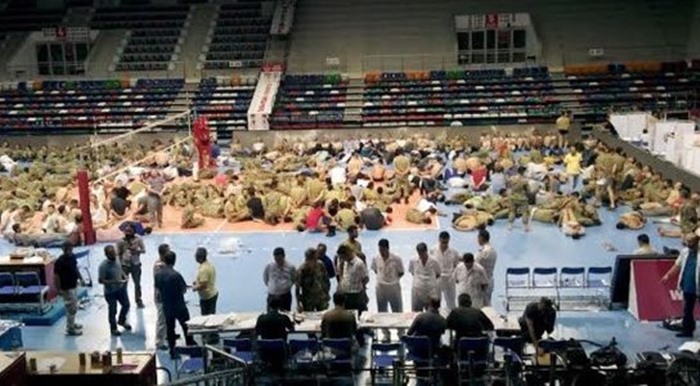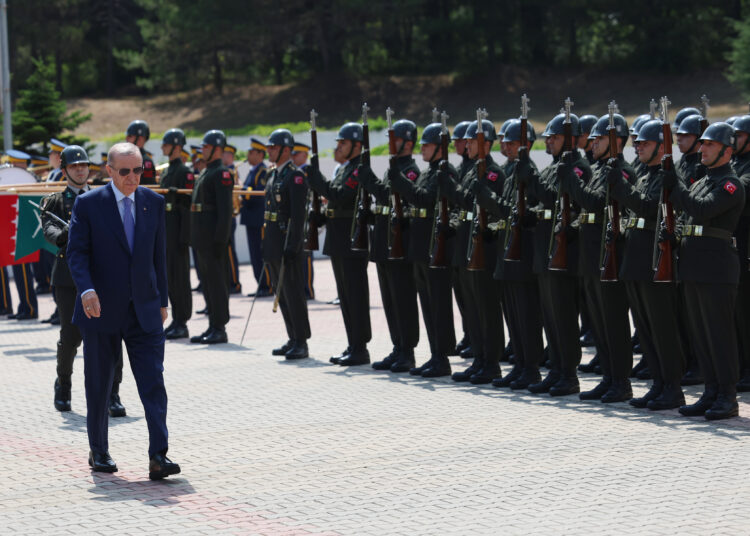Levent Kenez/Stockholm
Turkish President Recep Tayyip Erdogan shared updated statistics regarding the purge of military officers following a coup attempt on July 15, 2016 during a ceremony at the National Defense University on Saturday. He revealed that 1,524 out of 1,886 staff officers were purged from the Turkish Armed Forces (TSK). Additionally, of the 32,189 officers serving on July 15, 2016, a total of 10,468 have been expelled.
According to earlier figures announced by the Turkish Ministry of Defense at the end of 2023, a total of 24,339 members of the Turkish Armed Forces (TSK), including noncommissioned officers and civil servants, were dismissed.
Ironically, the official account states that only 8,651 military members took part in the coup, corresponding to 1.5 percent of the TSK. Of those, 1,761 were conscripts and 1,214 were military cadets. Given the fact that some 150 generals and thousands of lower-ranking officers were sentenced on coup charges, military experts find it odd that such an insignificant number of troops took part in the coup attempt.
Only 42 flag officers out of the 325 who were on active duty at the time of the abortive putsch managed to retain their rank or receive promotions after the coup attempt, confirming the view that Erdogan’s government was intent on transforming the military into a bastion of partisans, zealots and loyalists.

Staff officers form the leadership cadre of the TSK and are considered the military’s brain. According to unwritten practice, colonels who are staff officers, meaning those who graduated from the prestigious war academies, were typically promoted to the rank of general. These academies only accept candidates who pass a difficult entrance exam. Staff colonels used to speak at least one foreign language, hold master’s degrees in non-military fields and receive specialized training in war strategies, military tactics and troop management. They were often assigned to overseas missions, especially within NATO, and military attachés were usually selected from among them.
A Nordic Monitor survey in 2021 revealed that officers promoted to the rank of general in NATO’s second-largest army are relatively less educated and less qualified than their colleagues in previous years, particularly before 2016. After the 2016 coup attempt, the government also changed the procedure for selecting staff officers, which it viewed as a threat. Firstly, war academies were closed and a new faculty was established at the recently opened National Defense University under the name of the Joint War Institute. A different examination system was introduced, giving the government control over who could become a staff officer. Officers ranging from first lieutenant to lieutenant colonel are now eligible to take the staff exam, which was previously only available to first lieutenants and captains. Candidates who have the opportunity to become staff members will first participate in distance learning conducted by the National Defense University. Those who pass the final exams will then be accepted into staff officer training, which occurs in two different seasons.
Purged generals who were convicted and received lengthy prison sentences or are still standing trial are accused of alleged links to the Gülen movement, a group critical of Erdogan, which the government accuses of orchestrating the coup attempt. The movement strongly denies any role in the failed coup, and the government has failed to present any evidence of the movement’s complicity in the putschist attempt. Henri Barkey, who is now an adjunct senior fellow for Middle East studies at the Council on Foreign Relations, in February 2018 said many of the generals dismissed by the Turkish government were pro-NATO and pro-American, foreseeing a possible shift in Turkey-NATO relations.
It is no surprise that the first Turkish military incursion into Syria took place after July 15, 2016, given the fact that the military was apparently resisting Erdogan’s war plans in Syria as well as his alliance with Russia up until the first half of 2016.
Sönmezateş’s written statement to the court:
The former deputy chief of intelligence of the Air Force Command whose alleged role in the coup attempt in Turkey on July 15, 2016, led to his arrest and subsequent life imprisonment submitted a written statement to the court on July 10, 2023, revealing previously undisclosed details about the abortive putsch. In his written statement, Gökhan Sönmezateş noted that the officers were uneasy about Turkey’s increasing alignment with Iran and Russia, along with escalating corruption and the judiciary’s lack of response. He refutes the official narrative that the Gülen movement was behind the coup attempt. Moreover, he highlights that certain events during the coup, such as the closure of the Bosporus Bridge, aerial activities over cities and soldiers’ deployment, were not part of the original plan, leaving the reasons behind these actions unclear. During his testimony in court, Sönmezateş mentioned feeling betrayed by then-chief of general staff Hulusi Akar; however, he refrained from revealing more details due to threats, including the murder of his daughter, and discovering a bullet in his cell.

After the coup attempt, suspicions surrounding the false flag operation were further fueled by the fact that the MİT chief Hakan Fidan, who reportedly had no prior knowledge of the coup attempt, and Akar, who was unable to prevent his subordinates from participating in the failed coup, continued in their positions. The fact that Erdogan didn’t remove these two figures was interpreted by critics as him being aware of their involvement. In 2018 Akar became the minister of defense and currently serves as chairman of the parliamentary Defense Committee. Meanwhile, Fidan was appointed foreign affairs minister in June 2023.












